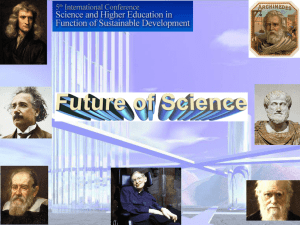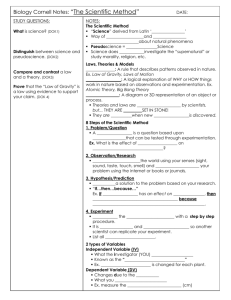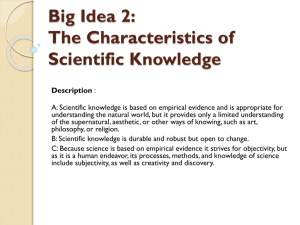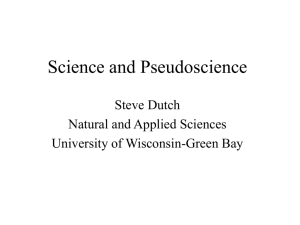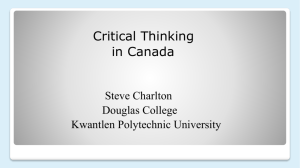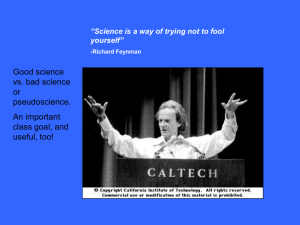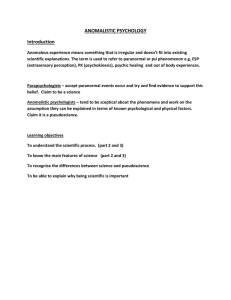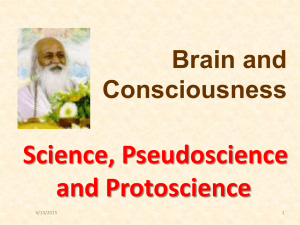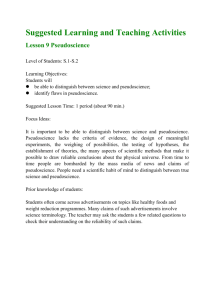CMPT 105 Building Interactive Systems
advertisement
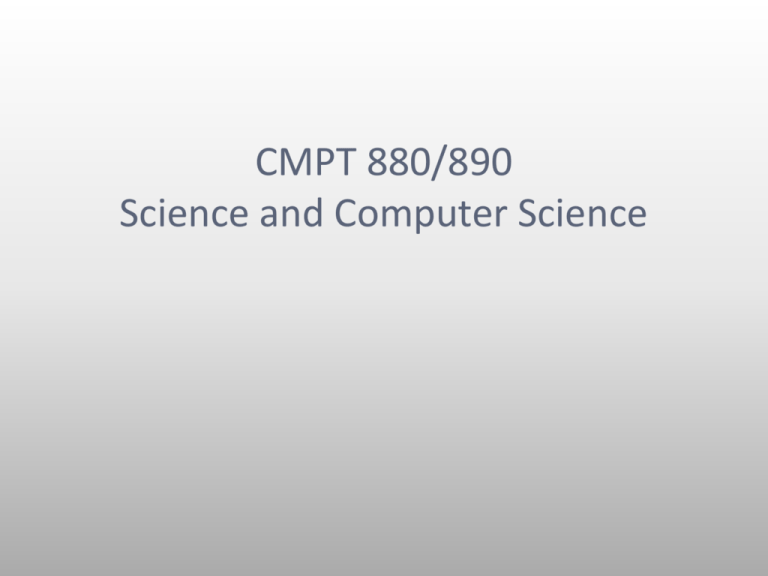
CMPT 880/890 Science and Computer Science Outline What is science? Scientific truth Pseudoscience The game of science What is computer science? Is computer science really science? Areas of computer science What is science? [a. F. science = Pr. sciensa, Sp. ciencia, Pg. sciencia, It. scienza, ad. L. scientia knowledge, f. scient-em, pr. pple. of scire to know.] The Indo-European root means to discern or to separate, akin to Sanskrit chyati, he cuts off, Greek schizein, to split, Latin scindere, to split. What is science? 1. a. The state or fact of knowing; knowledge or cognizance of something specified or implied; also, with wider reference, knowledge (more or less extensive) as a personal attribute. Now only Theol. in the rendering of scholastic terms (see quot. 1728), and occas. Philos. in the sense of ‘knowledge’ as opposed to ‘belief’ or ‘opinion’. 1882 SEELEY Nat. Relig. 260 Though we have not science of it [supernaturalism] yet we have probabilities or powerful presentiments. What is science? 2. a. Knowledge acquired by study; acquaintance with or mastery of any department of learning. Also pl. (a person's) various kinds of knowledge. 1390 GOWER Conf. II. 82 And Heredot in his science Of metre, of rime and of cadence The ferste was of which men note. What is science? 2c. fig. to blind with science (slang): to confuse by the use of polysyllabic words or involved explanations (see also quot. 1937).. 1973 Daily Tel. 17 Oct. 14/6 We are also more familiar..with the tendency for people to be blinded by science and to succumb to ‘expert’ medical opinion, however quackish. What is science? 3. a. A particular branch of knowledge or study; a recognized department of learning. In the Middle Ages, ‘the seven (liberal) sciences’ was often used synonymously with ‘the seven liberal arts’, for the group of studies comprised by the Trivium (Grammar, Logic, Rhetoric) and the Quadrivium (Arithmetic, Music, Geometry, Astronomy). c1386 CHAUCER Frankl. T. 1122 As yonge clerkes..Seken in euery halke and euery herne Particuler sciences for to lerne. What is science? 1119 1120 1121 1122 As yonge clerkes that been lykerous As young clerks that are eager To reden artes that been curious To read arts that are arcane Seken in every halke and every herne Seek in every nook and every cranny Particuler sciences for to lerne -To learn specialized branches of learning -- What is science? 3. b. Contradistinguished from art: see ART n. 8. The distinction as commonly apprehended is that a science (= ) is concerned with theoretic truth, and an art (= ) with methods for effecting certain results. Sometimes, however, the term science is extended to denote a department of practical work which depends on the knowledge and conscious application of principles; an art, on the other hand, being understood to require merely knowledge of traditional rules and skill acquired by habit. 1834 SOUTHEY Doctor cxx. (1862) 294 The medical profession..was an art, in the worst sense of the word, before it became a science, and long after it pretended to be a science was little better than a craft. What is science? 4. a. A branch of study which is concerned either with a connected body of demonstrated truths or with observed facts systematically classified and more or less colligated by being brought under general laws, and which includes trustworthy methods for the discovery of new truth within its own domain. 1882 ADAMSON in Encycl. Brit. XIV. 781/2 It may be said that in all sciences there are implied clearly defined notions, general statements or judgments, and methodical proofs. What is science? colligate, v. 1. trans. To bind or fasten together, connect. 2. fig. To bind together in a common interest or function (obs.), or in a class or order; to unite. What is science? “A connected body of demonstrated truths or observed facts…” Truths and facts about what? What is science? Science is the systematic study of the properties of the physical world… by means of repeatable experiments and measurements… and the development of universal theories that are capable of describing and predicting observations. (Dodig-Crnkovic) What is science? A process as much as a state: Science involves more than the gaining of knowledge. It is the systematic and organized inquiry into the natural world and its phenomena. Science is about gaining a deeper and often useful understanding of the world. (Dodig-Crnkovic) What is scientific truth? If scientists believe something, is it true? Truth vs. Belief vs. ‘Good Enough’ What is scientific truth? Do cellphones increase cancer risk? Are polycarbonate bottles harmful to your health? Is the earth warming up? Is smoking bad for you? Does gravity really exist? What is scientific truth? I think that we shall have to get accustomed to the idea that we must not look upon science as a “body of knowledge”, but rather as a system of hypotheses, or as a system of guesses or anticipations that in principle cannot be justified, but with which we work as long as they stand up to tests, and of which we are never justified in saying that we know they are “true”. Karl Popper, The Logic of Scientific Discovery What is scientific truth? Religion is a culture of faith; science is a culture of doubt. Richard Feynman The game of science How can all of this go wrong? Ptolemy and Copernicus Newton and Einstein Eugenics “Research shows that Buckinghams are a smoother cigarette” Science is about discovering truth, but is also a community of people The game of science the philosopher Bruno Latour brings a note of caution to the distinction between science and art [7]. Everything discussed in this column (a systematized body of knowledge, ability to make predictions, validation of models), is part of what he calls ready-made-science, science that is ready to be used and applied, science that is ready to support art. Much science-in-the-making appears as art until it becomes settled science. Latour defines science-in-the-making as the processes by which scientific facts are proposed, argued, and accepted. A new proposition is argued and studied in publications, conferences, letters, email correspondence, discussions, debates, practice, and repeated experiments. It becomes a “fact” only after it wins many allies among scientists and others using it. To win allies, a proposition must be independently verified by multiple observations and there must be no counterexamples. Latour sees science-inthe-making as a messy, political, human process, fraught with emotion and occasional polemics. The scientific literature bears him out. Everything Latour says is consistent with the time-honored definition of the science paradigm. After sufficient time and validation, a model becomes part of the scientific body of knowledge. Denning, p.29 Science vs. … How do you tell science from fringe science, junk science, or pseudoscience? Fringe science “unusual theories and models of discovery, [but] that have their basis in established scientific principles” (Wikipedia) Examples: Abiogenic petroleum origin Cold fusion Continental drift Prions Prions “Fifteen years ago I evoked a good deal of skepticism when I proposed that the infectious agents causing certain degenerative disorders of the central nervous system in animals and, more rarely, in humans might consist of protein and nothing else. At the time, the notion was heretical. Dogma held that the conveyers of transmissible diseases required genetic material, composed of nucleic acid (DNA or RNA), in order to establish an infection in a host. Even viruses, among the simplest microbes, rely on such material to direct synthesis of the proteins needed for survival and replication. Later, many scientists were similarly dubious when my colleagues and I suggested that these "proteinaceous infectious particles"--or "prions," as I called the disease-causing agents--could underlie inherited, as well as communicable, diseases. Such dual behavior was then unknown to science. And we met resistance again when we concluded that prions multiply in an incredible way; they convert normal protein molecules into dangerous ones simply by inducing the benign molecules to change their shape. Today, however, a wealth of experimental and clinical data has made a convincing case that we are correct on all three counts. Stanley Prusiner – Nobel Prize in Medicine, 1997 Junk science “claims about scientific data, research, and analyses that are driven by political, ideological, financial, or other unscientific motives” (wikipedia) generally used to describe the other people Pseudoscience “a body of knowledge, methodology, belief, or practice that is claimed to be scientific or made to appear scientific, but does not adhere to the scientific method, lacks supporting evidence or plausibility, or otherwise lacks scientific status” Astrology: claims so vague that they could never be refuted practitioners make little effort to develop the theory no attempts to critically evaluate the theory selective in considering evidence. focus on resemblances rather than cause-effect relations. Pseudoscience Use of vague, exaggerated or untestable claims Over-reliance on confirmation rather than refutation Lack of openness to testing by other experts Lack of progress Personalization of issues Use of misleading language How to protect yourself? Richard Feynman advocates “a kind of scientific integrity, a principle of scientific thought that corresponds to a kind of utter honesty” "We've learned from experience that the truth will come out. Other experimenters will repeat your experiment and find out whether you were wrong or right. Nature's phenomena will agree or they'll disagree with your theory. And, although you may gain some temporary fame and excitement, you will not gain a good reputation as a scientist if you haven't tried to be very careful in this kind of work. And it's this type of integrity, this kind of care not to fool yourself, that is missing to a large extent in much of the research in cargo cult science." Onwards to computer science… What is computer science? “the science of information processes and their interactions with the world.” (Denning) What is computer science? What can be (efficiently) automated “The discipline of computing is the systematic study of algorithmic processes that describe and transform information: their theory, analysis, design, efficiency, implementation, and application. The fundamental question underlying all of computing is, ‘What can be (efficiently) automated?’” What is computer science? Theory Experimentation Design What is computer science? Theory Building conceptual frameworks and notations for understanding relationships among objects in a domain and the logical consequences of axioms and laws. What is computer science? Experimentation Exploring models of systems and architectures within given application domains and testing whether those models can predict new behaviors accurately. What is computer science? Design Constructing computer systems that support work in given organizations or application domains. Is CS science? Computer science vs. natural sciences Computer science vs. engineering Computer science vs. mathematics Why do we get a bad name? CS is an immature science We need to be better scientists Criteria for Scientific Credibility Organized to understand, exploit, and cope with a pervasive phenomenon. Encompasses natural and artificial processes of the phenomenon. Codified structured body of knowledge. Commitment to experimental methods for discovery and validation. Reproducibility of results. Falsifiability of hypotheses and models. Ability to make reliable predictions, some of which are surprising. CS and pseudoscience Is CS susceptible to the problems of junk science, fringe science, and pseudoscience? Will you have to make moral and political decisions as a CS researcher? Is CS science? “I never liked the term ‘computer science’. … Computer science is a grab bag of tenuously related areas thrown together by an accident of history, like Yugoslavia. … Perhaps one day ‘computer science’ will, like Yugoslavia, get broken up into its component parts. That might be a good thing. Especially if it means independence for my native land, hacking” Paul Graham Areas of CS
